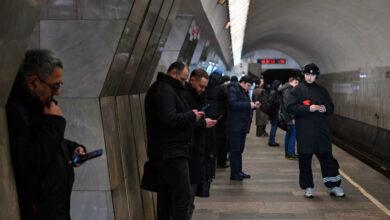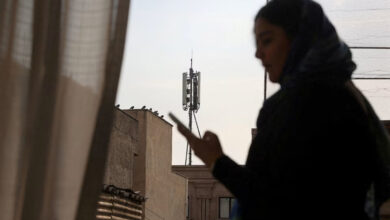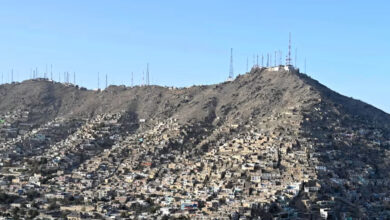As Muammar Qadhafi’s four-decade dictatorship comes to an end, Libyan authors have been sharing their joy and relief online, anticipating new currents in literary production.
Novelist Hisham Matar tweeted, “We got rid of Qadhafi. I never thought I would be able to write that sentence.” On the blog "Imtidad", short-story writer and poet Ghazy Gheblawy wrote about how Libyans have been “liberated from their fear.”
That fear penetrated deep into the language, Gheblawy wrote.
“Libyans like me who opposed his regime (whether subtly or overtly) had to develop a dual personality," Gheblawy wrote. “Learning how to talk and write publicly in code became a vital skill to avoid persecution, not only of yourself but your family and friends.”
Over the years, a large swath of Libyan fiction internalized this code.
While Egyptian authors embraced social realism in the 1960s and 1970s, many Libyan writers shied away from it. Some authors did write in a realistic style, such as Abdallah al-Ghazal in his “Toyota War.” But many others continued to rely on symbolist techniques, from metaphor to animal fables. Unlike the 1990s generation of Egyptian authors that rebelled against social realism, in Libya “the 1990s generation literature was born from fear of punishment. They just needed to…[avoid] putting themselves in trouble with the regime,” says author Mohamed Mesraty.
It was only in 2003, Mesraty said, that young Libyan authors began to re-emerge, adding that Libyan authors who live and write abroad have experienced greater creative freedom.
But even novelists who write in English seem to have been affected by a fear of Qadhafi. Hisham Matar’s second novel, “Anatomy of a Disappearance” released earlier this year is a deftly written realist work that foregrounds a kidnapping by the Libyan regime. Still, there is something exceptionally careful about the way “Anatomy” is written, as though the narrator were afraid of turning over too many stones, naming too many names, asking too many questions.
Philosophical fabulism and animal tales
Ibrahim al-Kony is one of the most celebrated of Libya’s older generation of authors. This December, he had the dubious distinction of being the last to win a Mubarak-era "Arabic Novel Award."
Kony's work largely shies away from engagement with the contemporary urban world. His novels are mostly fabulist-philosophical works set in the Hammadah al-Hamra desert. Some of his best are “Bleeding of the Stone” (translated by Chris Tingley and Maya Jayyusi), “The Animists,” and “Gold Dust” (translated by Elliott Colla). These novels tell us little about life in present day Libya. But, at their best, they draw a vivid portrait of the clash of humans, power, and animals and of humans’ violent destruction of our environment.
One of the hallmarks of Kony’s work is his sympathy for the wild sheep, camels, and gazelles that populate his novels. And he isn’t the only Libyan author with a particular interest in the animal world.
Ahmed Fagih's “Desert Rats,” (translated by Sorayya Allam and Chris Tingley) and published this year by Quartet, treats jerboas, ants, lizards, and humans with equal sympathy. Fagih, whose “Gardens of Night” trilogy made the Arab Writers Union’s “top 105” list, has frequently used animal characters in his novels and stories. In 2009, Egypt's Dar al-Shorouk released a special collection of Fagih's short stories, titled “In Criticism of Human Beings and in Praise of Animals and Insects.”
Other Libyan authors – Omar el-Kiddy in "The Wonderful Short Life of the Dog Ramadan" and Mohammed al-Asfar in “The Hoopoe” – have constructed rich fictional worlds around animals.
Qadhafi's long literary reach
It is not only Libyans who have had to cope with Qadhafi’s censorious fist. Egyptian author Idris Ali, who wrote most of his fiction about the poverty and alienation in Egypt’s Nubian region, saw his final book banned in 2010. His last book, a novella titled “The Leader is Getting a Haircut,” was seized because Egyptian State Security considered it insulting to the Libyan dictator.
The 130-page book was based on Ali’s four years as a foreign worker in Libya, and describes Egyptians toiling there under difficult conditions. In the words of the Arabic Network for Human Rights Information, the book “included testimonies of Libyans about social life there and how it was affected by repression under the rule of Colonel Qadhafi.”
Ali died in November 2010, before he could witness the changes currently sweeping through Egypt and Libya.
New literary prospects post Qadhafi
Things are clearly changing for Libyan letters. In the months since 17 February, new newspapers and poetry have appeared. But Mohamed Mesraty says that there is still a long way to go.
“Even after the fall of Qadhafi’s regime, we still need to fight for freedom in a society that never had it,” Mesraty said. “The fear starts from the family, neighborhood, and general readers. … The liberal Libyan author in Libya is also afraid of the other authors who won’t understand his writing.”
Revolutionary poetry has been the first post-Qadhafi writing. But Gheblawy feels that this sort of poetry will die out relatively soon, making way for a new style of poetry, which, he has predicted, “will become more descriptive, with a sense of narrative and detail of the daily life of Libyans, and less focus on language and style.”
Gheblawy hopes that many authors will also bring out works they’ve been unable to publish during the Qadhafi years. Gheblawy and Mesraty both lauded new, more realist tendencies in Libyan fiction. Younger authors – such as Beirut39 winner Najwa Binshatwan and Razan Naim al-Maghraby, who was longlisted for the 2011 International Prize for Arabic Fiction – have begun writing scenes of ordinary city life.
Gheblawy believes the general trend will be away from short symbolist works and toward longer poems and novels.
Mesraty hopes for many things in a new, freer Libya: the abolition of the Ministry of Media and Information, and an array of new private-sector publishers.
“We want Tripoli, the beautiful city of history and culture, to witness the beauty of Libyan literature and art, too,” he said.




